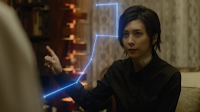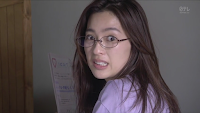Tonally defective yet thematically complex, Kaito Yamaneko has this skittish energy that runs counter to the weightiness of its socio-cultural commentary resulting in one bifurcated mess of a series. It lends itself to sharp changes in mood, characterization and storytelling---so unnerving that even a Kamenashi Kazuya apologist would have trouble defending it. Unleashing a cascade of what appears to be utter nonsense amidst its bipolarity, it is consistent in its inconsistencies and yet curiously steadfast in advocating the identification and practice of core values even as it lumbers wearily to its befuddling conclusion.
It's easy to dismiss it as a loonier version of those page to screen adaptations of suspense thrillers that went off kilter (e.g. Bloody Monday and Jiu) but on closer inspection, it's more like the jdorama that has something to say but doesn't know how to say it.... or does it? The show in itself tackles too many social maladies and references historical events pertaining to Japan to be brushed off as whimsy or coincidence. Kaito Yameneko is zany, offensive and culture-specific, which leads this particular reviewer to believe that all the insanity and shaky tirades are intentional and should be taken as no less than satire disguised as pointless, childish entertainment.
It's easy to dismiss it as a loonier version of those page to screen adaptations of suspense thrillers that went off kilter (e.g. Bloody Monday and Jiu) but on closer inspection, it's more like the jdorama that has something to say but doesn't know how to say it.... or does it? The show in itself tackles too many social maladies and references historical events pertaining to Japan to be brushed off as whimsy or coincidence. Kaito Yameneko is zany, offensive and culture-specific, which leads this particular reviewer to believe that all the insanity and shaky tirades are intentional and should be taken as no less than satire disguised as pointless, childish entertainment.
Much like GTO and Gokusen, the main character of this series is someone who acts with righteous zeal and whose loud, fervid demeanor belies a capacity for brutality. Made out to be extremely abrasive, the great thief Yamaneko (Kamenashi Kazuya) is not exactly a lovable character---cartoonish to a fault, he wets his pants, sings out of tune, and wears flip flops during winter to air out a chronic case of athlete's foot. But make no mistake, he's out on a mission. As rogue agent turned ferocious ally of justice, he's out to take down a legendary crime boss and leader of the country's shadow government, Yuuki Tenmei. In the process, he exposes corruption and wrongdoing, steals from the rich to give back to the poor, deriding both the offender and victim for lacking in principles and being empty at their core.
Using the Stray Cat Detective Agency as his cover, Yamaneko tackles each case with the help of a kindly den mother (Otsuka Nene), a talented high school hacker (Hirose Suzu) and a reluctant but gullible magazine reporter (Narimiya Hiroki). Secretly working alongside them is his former handler, turned police detective, Sekimoto (Sasaki Kuronosuke), who obstructs the investigation every time detectives Kirishima (Nanao) and Inui (Ikeuchi Hiroyuki) get too close for comfort. It's all fun and games with ridiculous heist sequences until someone dies, a mysterious woman with a vendetta appears and the villain manifests himself in a spindly life support system helmet. When Yamaneko comes face to face with a ruthless mercenary known as the Chameleon, a modicum of danger and intrigue is introduced to the series only to have the tomfoolery resurface with renewed force.
Using the Stray Cat Detective Agency as his cover, Yamaneko tackles each case with the help of a kindly den mother (Otsuka Nene), a talented high school hacker (Hirose Suzu) and a reluctant but gullible magazine reporter (Narimiya Hiroki). Secretly working alongside them is his former handler, turned police detective, Sekimoto (Sasaki Kuronosuke), who obstructs the investigation every time detectives Kirishima (Nanao) and Inui (Ikeuchi Hiroyuki) get too close for comfort. It's all fun and games with ridiculous heist sequences until someone dies, a mysterious woman with a vendetta appears and the villain manifests himself in a spindly life support system helmet. When Yamaneko comes face to face with a ruthless mercenary known as the Chameleon, a modicum of danger and intrigue is introduced to the series only to have the tomfoolery resurface with renewed force.
Kaito Yamaneko is frustrating to watch as it shifts gears from one moment to the next without prior warning. Even when the chips are down and blood is spilled, the show makes room for a light-hearted intermission. Much like how socio-anthropologists and cultural psychologists write about theories on the search for identity in Modern Japan, the show is continuously at odds with itself, unable to determine whether it's supposed to be a slapstick caper or a wannabe political espionage thriller. The action sequences are likewise plagued with this schizophrenic touch, some being decently choreographed fight scenes, while others resembling a mix of the hammy 70s Batman scuffles with a little bit of the Three Stooges' smacks, slaps and kicks.
Replete with annoying shenanigans and cruel impassioned sermons, it can grate on the ear and try one's patience but at the same time one can also tell that it's intended to reach a particular audience. It makes mention of issues particular to Japan and paints a rather dim and sad picture of a society wherein the youth pass on the blame and do not take responsibility for their actions, where parents betray and give up on their children and politicians view their constituents as dumb sheep fit to be manipulated. The antagonist is virtually a phantom that is symbolic of a rigid but obsolete economic and social system that once provided wealth and prosperity but now struggles to cope with changes in the global age. The hero, being representative of a value system of a bygone era, is someone who is of equally questionable relevance and lost in the fray.
Kaito Yamaneko is the type of show that can be deconstructed in a number of ways---it has lofty ideas beneath a barrage of distractions, probably designed to soften its message and make it agreeable to a wide audience. Is it interesting or entertaining enough to pass off as a light, harmless series in the same vein as a Lupin III live action adaptation without need of figuring out the context in which it was made? Sadly, it's not. It's too jarring for a serious viewer and too abstruse for a casual one.
Replete with annoying shenanigans and cruel impassioned sermons, it can grate on the ear and try one's patience but at the same time one can also tell that it's intended to reach a particular audience. It makes mention of issues particular to Japan and paints a rather dim and sad picture of a society wherein the youth pass on the blame and do not take responsibility for their actions, where parents betray and give up on their children and politicians view their constituents as dumb sheep fit to be manipulated. The antagonist is virtually a phantom that is symbolic of a rigid but obsolete economic and social system that once provided wealth and prosperity but now struggles to cope with changes in the global age. The hero, being representative of a value system of a bygone era, is someone who is of equally questionable relevance and lost in the fray.
Kaito Yamaneko is the type of show that can be deconstructed in a number of ways---it has lofty ideas beneath a barrage of distractions, probably designed to soften its message and make it agreeable to a wide audience. Is it interesting or entertaining enough to pass off as a light, harmless series in the same vein as a Lupin III live action adaptation without need of figuring out the context in which it was made? Sadly, it's not. It's too jarring for a serious viewer and too abstruse for a casual one.
RATING:

SHARPLY BIPOLAR
TONE-DEAF SINGING
INTENDED SOLELY FOR JAPANESE AUDIENCE
LOOSE COMMENTARY ON JAPANESE SOCIETY














































